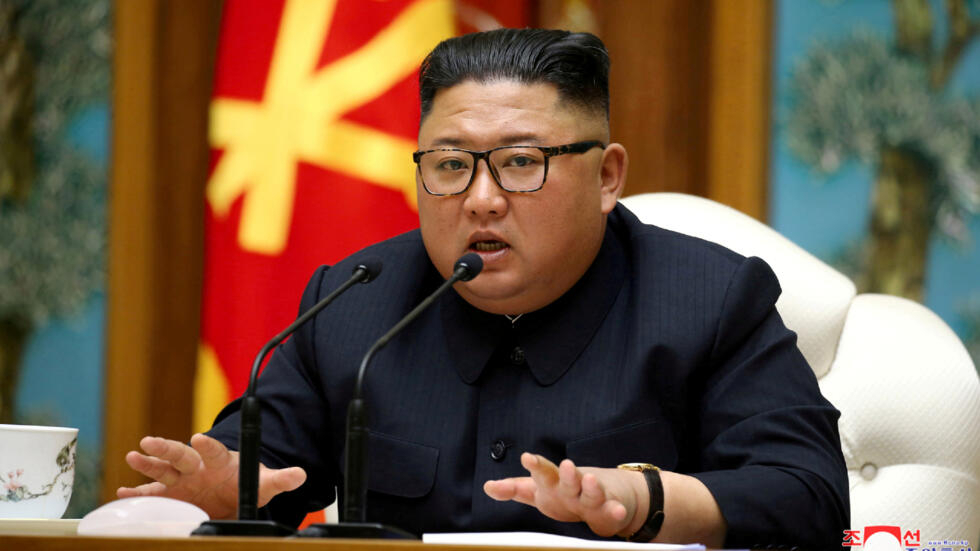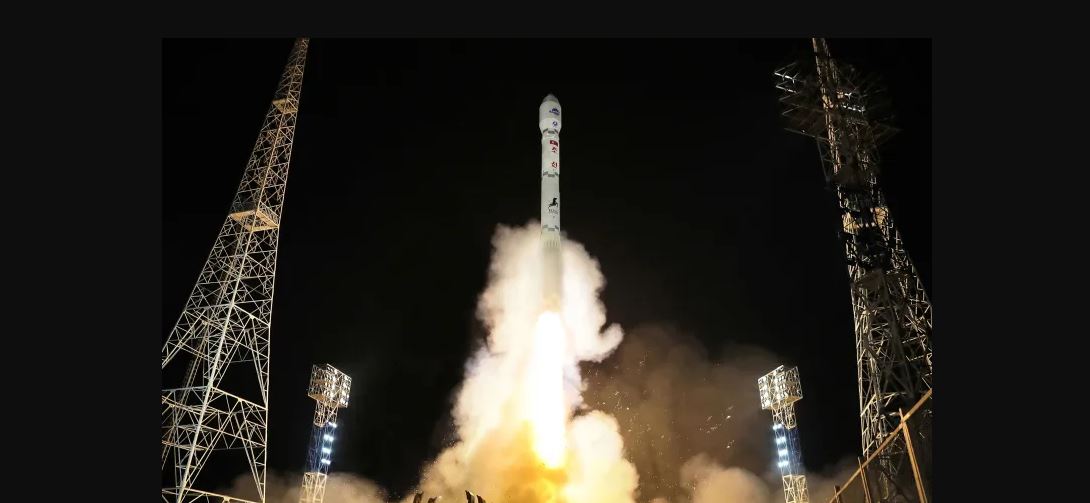Kim Jong Un Plans To Launch Three Satellites In 2024, Warns Of Inevitable War
North Korean leader Kim Jong Un plans to launch three satellites in 2024, warns of inevitable war amid increasing the production of nuclear materials and introducing modern attack drones.
Author:Rhyley CarneyReviewer:Paula M. GrahamJan 01, 202410.1K Shares168.9K Views

North Korean leader Kim Jong Un plans to launch three satellites in 2024, warns of inevitable waramid increasing the production of nuclear materials and introducing modern attack drones. These statements were made during a key ruling Workers’ Party meeting aimed at setting state goals for the upcoming year. In response to what he perceives as confrontational actions taken by the United States, Kim emphasized the need for "overwhelming" war readiness.
Kim's remarks suggest a potential escalation of weapons tests leading up to the U.S. presidential elections in November. Some observers speculate that Kim sees a bolstered nuclear capability as a means to engage in high-stakes diplomacy with the U.S., especially if former President Donald Trump were to return to the White House, offering the possibility of sanctions relief.
During the five-day meeting that concluded on Saturday, Kim criticized what he called "vicious" anti-North Korea actions by the United States and its allies, stating that these moves have pushed the Korean Peninsula to the brink of a nuclear war. He specifically pointed to the expansion of U.S.-South Korean military exercises and the temporary deployment of powerful U.S. military assets, including bombers and a nuclear-armed submarine, in South Korea. These steps were taken in response to North Korea's ongoing weapons testing activities since the previous year.
According to KCNA, the official Korean Central News Agency, Kim Jong Un has emphasized the need for an "overwhelming war response capability" to deter potential provocations from adversaries. The North Korean leader outlined plans to launch three additional military spy satellites in the coming year, building upon the country's first reconnaissance satellite launched in November.
Emphasizing the importance of establishing "a reliable foundation," Kim alluded to the need for facilities that produce fissile materials, such as weapons-grade plutonium and highly enriched uranium, for nuclear weapons. Also, he directed authorities to bolster submarine capabilities and advance the development of various modern unmanned combat equipment, including armed drones.
“„Pyongyang might be waiting out the U.S. presidential election to see what its provocations can buy it with the next administration. The Kim regime has closed the political door on denuclearization negotiations but could offer rhetorical restraint and a testing freeze in exchange for sanctions relief. Although North Korea has no intention of giving up nuclear weapons, it might try to extract payment for acting like a so-called responsible nuclear power.- Leif-Eric Easley, a professor at Ewha University in Seoul
Following the breakdown of diplomacy with Trump in 2019, Kim Jong Un has been prioritizing the modernization of North Korea's nuclear arsenal. The impasse was mainly over disagreements on the extent of sanctions relief in exchange for a partial surrender of North Korea's nuclear program. Experts suggest that Kim may believe a second Trump term could lead to concessions, especially given the U.S.'s focus on the Russia-Ukraine conflict and the Israel-Hamas tensions.
Nam Sung-wook, a professor at Korea University, believes that if President Joe Biden is reelected, North Korea is unlikely to achieve its objectives. However, he predicts that a Trump victory could reignite diplomacy, with Trump potentially pledging to persuade North Korea to suspend weapons tests during his campaign.
Nam suggests that Kim's commitment to increasing plutonium and uranium production is a strategic move to strengthen negotiating leverage. He anticipates that North Korea will conduct more test launches of intercontinental ballistic missiles capable of reaching the continental U.S. in the coming year.
“„North Korea will act to the fullest extent under its timetable for provocation until the U.S. election day.- Nam Sung-wook
In his address at the party meeting, Kim Jong Un employed aggressive and scornful language towards South Korea, branding it as "a hemiplegic malformation and colonial subordinate state" with a society tainted by what he referred to as "Yankee culture." He explicitly declared that South Korea should not be regarded as a partner for reconciliation or unification and directed the military to utilize all available means, including nuclear weapons, to conquer South Korea in the event of a conflict.
Responding to Kim's statements, South Korea's Unification Ministry issued a strong condemnation, criticizing North Korea for advancing its nuclear program and displaying hostility toward its neighbors. The ministry pledged to vigorously deter North Korean threats through a robust alliance with the United States.
There is speculation among analysts that limited clashes between North and South Korea along their tense land and sea borders could occur in the coming year. South Korea's spy agency recently indicated that North Korea is likely to engage in military provocations and cyberattacks leading up to the South Korean parliamentary elections in April and the U.S. presidential election in November.
Kim Jong Un emphasized the need for North Korea to increase cooperation with "anti-imperialist, independent" nations that oppose American-led Western hegemony. Although Kim did not explicitly name the countries, North Korea has been working to enhance collaboration with Russia and China. These nations have consistently thwarted U.S. and allied efforts to tighten United Nations sanctions against North Korea in response to its prohibited missile tests.
While the U.S. and South Korea allege that North Korea has supplied artillery and ammunition to Russia in exchange for advanced Russian military technologies, Julianne Smith, the U.S. permanent representative to NATO, stated this month that the suspected Russian technologies sought by North Korea pertain to fighter aircraft, surface-to-air missiles, armored vehicles, ballistic missile production equipment, or similar materials. U.S. intelligence suggests that North Korea has provided Russia with over 1,000 containers of military equipment and munitions.
South Korean officials have suggested that Russian support likely played a role in North Korea successfully placing its spy satellite into orbit on November 21. While some foreign experts express skepticism about the satellite's capabilities, South Korean Defense Minister Shin Wonsik asserted in November that Russia might assist North Korea in producing higher-resolution satellite photos.
According to Yang Uk, an analyst at Seoul's Asan Institute for Policy Studies, North Korea has not yet acquired fully functional intercontinental ballistic missiles (ICBMs) capable of launching nuclear strikes on the continental U.S. However, he noted that North Korea's shorter-range nuclear-armed missiles have the potential to reach South Korea and Japan, where a significant presence of 80,000 American troops is stationed.
Estimates of the size of North Korea's nuclear arsenal vary, ranging from 20-30 bombs to over 100. Recently, the U.N. atomic agency and foreign experts indicated that North Korea seems to have initiated the operation of a light-water reactor at its main nuclear complex, potentially aiming to secure a new source for weapons-grade plutonium.
Conclusion
During the meeting, Kim Jong Un claimed "eye-opening" economic achievements, citing the fulfillment or surpassing of set quotas in major areas such as farming, housing construction, and fisheries. Analysts, including Nam Sung-wook, suggest that this self-praise is likely intended to enhance Kim's image as a leader who prioritizes both public livelihoods and military matters.
Jump to

Rhyley Carney
Author

Paula M. Graham
Reviewer
Latest Articles
Popular Articles
